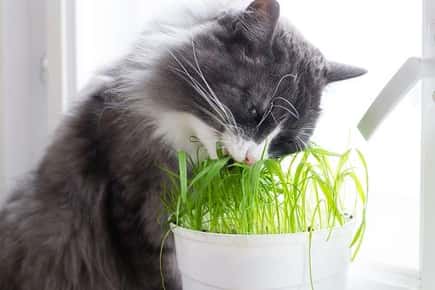
Does your pet regard your lawn as the perfect place to snack? Eating grass may not seem very appetizing to you, but your pet doesn't share your disdain. In fact, both dogs and cats enjoy eating a little grass from time to time. We'll explore why pets eat grass and explain what you should do if you notice that your furry friend loves the green stuff.
Why Does My Pet Eat Grass?
Pets eat grass for a variety of reasons. Some simply like the taste and find that chewing on a little grass enhances their usual diet of dog or cat food. Hunger is another possible reason. If your furry friend is hungry, grass may look awfully tempting. Although some pets never seem to be full, eating grass due to hunger may mean that your pet isn't receiving the nutrients needed for good health.
If you've recently decreased the amount of food your pet receives due to concerns about weight or have noticed that your pet always seems hungry, it's a good idea to schedule a visit with the veterinarian. Your pet's vet can provide advice about the best types of food products and tell you how much food your pet really requires. In some cases, constant hunger may be a sign of a disease, such as diabetes or a tumor.
Does Eating Grass Mean My Pet Has an Upset Stomach?
Grass eating may be a natural way to handle minor digestive problems in dogs and cats, according to one theory. If your pet has an upset stomach, eating grass may trigger vomiting and relieve your pet's nausea. It may also act as a natural laxative if your dog or pet is constipated. Although some people assume that eating grass always leads to vomiting, only a small percentage of pets actually vomit after ingesting grass.
Is Eating Grass Dangerous?
Eating grass usually won't harm your pet, unless your lawn has been treated with pesticides. Researchers discovered that dogs exposed to pesticides in lawn care products had a 70 percent higher risk of canine malignant lymphoma. The study was published in the January 2012 issue of Environmental Research.
What Should I Do If My Pet Enjoys Grazing on My Lawn?
There's no need to discourage the habit if your pet enjoys eating a little grass and doesn't experience any ill effects. If grass eating causes frequent vomiting, an examination by your pet's veterinarian can uncover the cause of the problem.
When grass is one of your pet's favorite snacks, it makes sense to avoid using lawn care products on your yard. If you do use the products, don't give your pet unsupervised access to your yard and your tasty grass. Because it's not known how long treated grass will retain the chemicals that harm pets, it's best to avoid ever letting your dog or cat eat treated grass. Instead, provide a small patch of untreated grass for your pet's snacking pleasure.
Unfortunately, you can't always tell if public parks or the laws you pass on your daily walks have been treated with pesticides. For your pet's health, assume that every blade of grass has been treated. If your pet tries to sample your neighbors' yards, gently pull him or her away from the lawn and offer a small treat instead.
If it's not convenient to establish a pesticide-free zone in your yard, consider growing grass inside your home. Planting grass in pots or containers is a simple way to ensure that your furry friend has a source of fresh, safe grass. Not sure what kind of grass to plant? Wheatgrass seeds, available online and in garden stores, offer a good source of protein, potassium, fiber, iron, zinc, copper and vitamins A, C, E, K, and B6.
Are you concerned about the effects of grass eating on your pet's health? Call us today to schedule a convenient appointment.
Sources:
Modern Dog: A Vet’s Take on Why Dogs Eat Grass
http://moderndogmagazine.com/articles/vet-s-take-why-dogs-eat-grass/297
PetMD: Why Do Cats Eat Grass?
http://www.petmd.com/cat/wellness/evr_ct_eating_grass
National Institutes of Health: Environmental Research: Household Chemical Exposures and the Risk of Canine Malignant Lymphoma, a Model for Human Non-Hodgkin’s Lymphoma, 1/12
